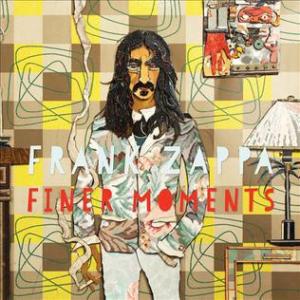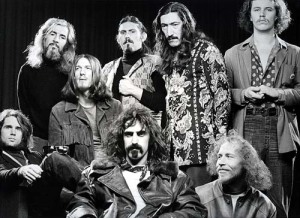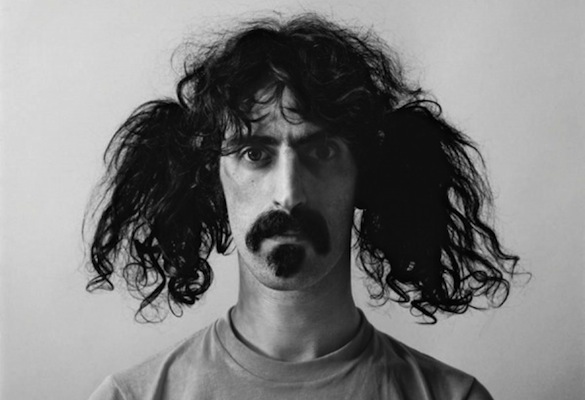 The most interesting thing to me about the Frank Zappa vaults is their seemingly endless supply of material. Most of it’s been concerts taped and stored for later use. Other releases have been snippets and odds and ends of live shows, songs clipped from reels and saved because there was a good solo, a one-time only improvisation, etc. This is what most longtime recording artists have in their vaults; the Grateful Dead have released dozens of live albums of this kind.
The most interesting thing to me about the Frank Zappa vaults is their seemingly endless supply of material. Most of it’s been concerts taped and stored for later use. Other releases have been snippets and odds and ends of live shows, songs clipped from reels and saved because there was a good solo, a one-time only improvisation, etc. This is what most longtime recording artists have in their vaults; the Grateful Dead have released dozens of live albums of this kind.
But with Zappa, there’s a fascinating amount of scrapped albums in there. Since his death in 1993, some nine fully formed albums have come out. The most recent, and a good album to boot, is Finer Moments, released this past December.
Planned as a two-LP set (it even has Zappa saying “you have just heard a make-believe record scratch, end side one”), Finer Moments would’ve been a release in the mould of albums like Weasels Ripped My Flesh or Chunga’s Revenge: a mix of studio oddities, a few fully formed songs and some long, recorded-live jams.
Unlike those two albums, which are some of the best in the Zappa catalogue, Finer Moments has sections that drag. But it also has some of the Mothers best performances. It’s a strange collection that’s both a must-listen for Mothers fans and overstuffed. Let’s break it down, side by side.
The first side of the album is largely taken from a live concert in London in 1969, showing the Mothers of Invention at their chaotic best: it opens with “Sleazette”, a searing Zappa guitar solo where his amp sounds on the verge of liquid collapse. From there, it’s to a planned event: while MOI keyboardist/sax player Ian Underwood plays a Mozart sonata, the band plays around on stage in what Zappa calls a “grotesque parody of the ballet.” It must have been fun to watch, but the effect’s lost on an album like this. At song’s end, one band member is turned into a zombie and the band goes into an improvised section with deep shades of Varese.
Two long jams fill out the disc: “The Old Curiosity Shoppe”, excerpted from a show in 1971, and “Uncle Rhebus”, from a 1969 performance. Both feature these bands in full flight: Zappa rips off solos, but so do Underwood, keyboardist Don Preston and sax player Bunk Gardiner.
Disc two is a little more uneven. The dullest point is a long percussion track likely to set the record for the most skipped-over track on any Zappa album. There’s his music from a cough drop commercial. It’s saved by two live MOI cuts: “There Is No Heaven From Where Slogans Go To Die”, a moody percussion-driven jam and the chaotic “Squeeze It, Squeeze It, Squeeze It,” where between wild bursts of music, Mothers bassist Roy Estrada moans, groans and laughs into the microphone in a fit of ecstasy.
The album finishes with a long improvised performance from a 1971 concert in Carnegie Hall. The long track opens with a wild guitar solo, edits into a Moog solo where it sounds like Don Preston is trying to push his keyboards to the breaking point, a drum solo and finally another Zappa guitar break that fades out in applause.
Disc two also has the most fascinating track on the album, “Pumped and Waxed”. An experimental piece recorded by Zappa in his basement studio, mostly on a keyboard that sounds like a touch tone phone, this is a primitive ancestor to his other basement recordings like Feeding the Monkeys at My Maison or Jazz From Hell. It’s interesting to hear Zappa was experimenting with synths in his basement, making the first steps in one of the major branches of his career.
I’m not completely sure of the story behind this release: it was likely assembled when Zappa was in a wheelchair and unable to perform live. I assume it meant for release sometime around 1972, but for whatever reason it wasn’t. So this project sat in the vault, its contents repurposed.
For example, all the cough drop commercial stuff saw release 1996’s The Lost Episodes. “Squeeze It…” was released in 1998 on Mystery Disc, as was an edited version of “You Never Know Who Your Friends Are”. Most of side one and parts of “Uncle Rhebus” and “There Is No Heaven…” wound up on volumes of You Can’t Do That On Stage Anymore. And side four is on 2011’s Carnegie Hall. So there isn’t a wealth of new material here: about half of it is previously released, although here in longer edits or alternate mixes.
 So Finer Moments juxtaposes Zappa’s first two major bands, playing their strengths off each other. The original Mothers were a darker, more serious band who explored the limits of what rock music was in the 1960s. The Flo end Eddie-era Mothers were more polished and professional sounding: their live jams are tighter, but don’t have the same feeling that anything could happen. In so many words, they lack the danger of the 60s band.
So Finer Moments juxtaposes Zappa’s first two major bands, playing their strengths off each other. The original Mothers were a darker, more serious band who explored the limits of what rock music was in the 1960s. The Flo end Eddie-era Mothers were more polished and professional sounding: their live jams are tighter, but don’t have the same feeling that anything could happen. In so many words, they lack the danger of the 60s band.
If this album was released back in the day, it probably wouldn’t have been as well received: the jams are long and a few cuts I’d charitably describe as filler. But it’s a good bridge between his first two bands, showing each at the top of their live game. There’s enough here for me to recommend the album to people already who are already into Zappa: this won’t make you a fan of the Mothers, but if you already are, it’s another gift from the vault.


